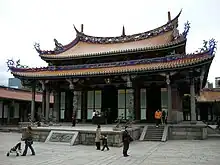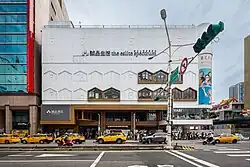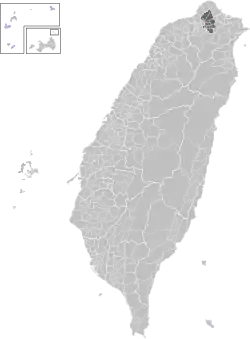Datong District, Taipei
Datong District or Tatung is a district of Taipei City, Taiwan. It is located between the Taipei Metro Red Line and eastern shore of the Tamsui River, and between Civic Boulevard and the Sun Yat-sen Freeway. The southern part of this area used to be the site of Twatutia, one of the first settlements in what is now Taipei and for a time the area's commercial center.[1] Taipei's commercial center has since shifted south east to Zhongzheng, Da'an and Xinyi, and Datong is far less important economically. One of the last vestiges of Twatutia's commercial importance disappeared with the closing of the Chien-Cheng Circle in 2006. The north was the site of the village of Daronpon.
.jpg.webp)

Datong
大同區 | |
|---|---|
| Datong District | |
 View of Eslite Spectrum Nanxi on Nanjing West Road | |
 | |
| Country | Republic of China (Taiwan) |
| Region | Western Taipei |
| Divisions | List
|
| Area | |
| • Total | 5.6815 km2 (2.1936 sq mi) |
| • Rank | Ranked 12th of 12 |
| Population (January 2023) | |
| • Total | 119,123[1] |
| • Rank | Ranked 11th of 12 |
| Postal code | 103 |
| Website | dtdo |
| Datong District, Taipei | |||||||||||||
|---|---|---|---|---|---|---|---|---|---|---|---|---|---|
| Traditional Chinese | 大同區 | ||||||||||||
| Literal meaning | Great Harmony District | ||||||||||||
| |||||||||||||
| Twatutia (old name) | |||||||||||||
| Traditional Chinese | 大稻埕 | ||||||||||||
| |||||||||||||
History
During the Qing Dynasty, the district was named Daronpon (Chinese: 大浪泵; Pe̍h-ōe-jī: Tōa-lông-pōng), Paronpon, and other variants, but was renamed Toaliongtong (大隆同; Toā-liông-tông) in 1844. Following the Second Opium War, a port was opened in Twatutia for international trade. Foreign trade resulted in the economic development of the district.
In 1946, the district's name was changed to Tatung (大同), which means "Great Unity", the Confucian notion of utopia which is in the lyrics of the National Anthem of the Republic of China. In 1990, the district merged with neighboring Jiancheng and Yanping Districts to create today's enlarged Datong District.[1] The spelling became "Datong" due to switching to the Pinyin Chinese romanization system.
Administrative divisions
The district consists of Bao'an, Dayou, Guangneng, Guoqing, Guoshun, Jiangong, Jianming, Jiantai, Jingxing, Laoshi, Linjiang, Longhe, Minquan, Nanfang, Penglai, Shuanglian, Siwen, Xingming, Yangya, Yanping, Yongle, Yuquan, Zhaoyang, Zhisheng and Zhongqing Village.
Government institutions
Tourism
It is most notable for its Japanese period and Qing period architecture, especially along Dihua Street. It is also famous for the Dihua (Tihua) Street Market during the Lunar New Year holidays. The market sells dried fruits, nuts, dried meats, dried seafood, snacks, and health drinks.[1]
Other attractions in Datong include Tianma Tea House, Taiwan New Cultural Movement Memorial Hall, Chen Tian-lai Residence, Ama Museum, Chiang Wei-shui Memorial Park, Chen Dexing Ancestral Hall, Museum of Contemporary Art Taipei, Customs Museum, Taipei Confucius Temple and Bao-an Temple in the Dalongdong area, the Xia Hai City God Temple and Cisheng Temple in Dadaocheng area.[1] Datong also contains the Qsquare, Yongle Market (also on Dihua Street), Ningxia Night Market, Yansan Night Market and Dalong Night Market.
Transportation
Rail
Datong is served by the following stations of the Taipei Metro:
Road
By road, the district is served by National Highway No. 1, Provincial Highway No. 1, and Provincial Highway No. 2.
It is also the location of the Taipei Bus Station, the largest bus terminal in the city.
Water
The Dadaocheng Wharf is located within the district.
Notable natives
- Chiang Chia, manager of Chinese Taipei national football team (1981–1985)
- Chiang Peng-chien, chairperson of Democratic Progressive Party (1986–1987)
- Frank Hsieh, Premier of the Republic of China (2005–2006)
- Huang Tien-fu, member of Legislative Yuan (1981–1984, 1996–1999)
- Kuo Chin-fa, former singer
- Tsai Eng-meng, businessperson
- Yeh Ching-chuan, Minister of the Department of Health (2008–2009)
Local Food
- Red Tea House (紅茶屋), Bubble tea (珍珠奶茶)
- Pineapple cake (鳳梨酥), 維格餅家
See also
References
- "About Datong District". Taipei City Government. 2010-01-11. Retrieved 2010-07-18.
External links
- Official website
 (in Chinese)
(in Chinese)  Datong District travel guide from Wikivoyage
Datong District travel guide from Wikivoyage